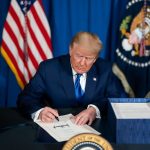Top officials from the Trump administration have jumped into the spotlight, defending their upcoming talks with Moscow as a much-needed effort to resolve the stubborn Russia-Ukraine war. This bold move has Kyiv’s President Volodymyr Zelenskyy sounding the alarm, as he has firmly asserted that any deal made without Ukraine at the negotiating table will simply not fly. This raises the question of who really gets a say in the fate of Ukraine—because it definitely isn’t going to be dictated by a backroom deal between Washington and the Kremlin.
As President Trump moves ahead with his promise to put an end to this nearly four-year-long conflict, reactions are as diverse as a box of chocolates. In the U.S., many officials are praising Trump as the only leader with the gumption to put an end to what many have dubbed an interminable stalemate. Meanwhile, the Kremlin is basking in the glow of these talks, suggesting that something resembling civility is being restored between the Cold War rivals. Really, that should give one pause about how this is all playing out.
🚨 'Peace is not a noun, it's a verb, it's an ACTION' — Rubio says Ukrainian peace is not entirely up to US! ‘Everyone should be celebrating we have an American President that is seeking not to start wars, but END them!’ pic.twitter.com/9Q1ZjGVGv1
— US Homeland Security News (@defense_civil25) February 17, 2025
Across the Atlantic, however, the responses are far less rosy. Many European leaders, still aligned with the Biden administration in their commitment to supporting Ukraine, are suddenly feeling a bit left out in the cold. Zelenskyy, showing no signs of conceding, fears that a deal without Ukraine could embolden Putin to take a swing at NATO next. British Prime Minister Keir Starmer is already waving the red flag, calling an emergency meeting to discuss this shifting landscape, as they’re concerned they’re being frozen out of the process altogether.
In response to the prospect of peace talks, the Trump administration is making a case for accepting the grim reality that this war can’t simply be won on the battlefield, marking a drastic shift in tone from earlier stances. White House officials suggest that the war has turned into some grotesque “meat grinder,” clearly hoping to get the rest of the world on board with the idea that a dialogue is needed. Secretary of State Marco Rubio’s discussions with his Russian counterpart hint at planning future high-level talks in Saudi Arabia—are they listening to the man on the ground in Ukraine, or just playing geopolitical chess at Kyiv’s expense?
Mixed signals are abundant, with U.S. officials expressing doubts about whether Ukraine can realistically reclaim lost territory from Russia. The situation on the battlefield is dynamic, with reports of Russian forces making gains in the east. Conversely, Ukrainian troops are making small victories that suggest the fight is not over. As Zelenskyy digs in his heels against any imposed deals, he emphasizes that a solution cannot exclude Ukraine, casting a long shadow over the Trump administration’s intentions.
Compounding the complexity are comments from retired General Keith Kellogg, who left open the possibility of Ukraine being included at the negotiations but quickly ruled out involving European allies. Such a stance raises eyebrows and questions about the real allies of Ukraine in this conflict. Rubio’s insistence that it’s too soon to declare serious negotiations may soothe some nerves, but the reality is that without Ukrainian involvement, it’s hard to see how any peace deal could stick.
As the European leaders huddle in Paris to discuss their next steps, there’s an air of uncertainty. Trump has shown that he values dialogue, even if it means leaving Ukraine in a lurch. In the end, one might wonder who will be left holding the bag if the negotiations go sideways. The stakes are high, and clear communication about who gets a seat at the table is more critical than ever. Those looking for absolute resolution in this quagmire of international politics will need to fasten their seatbelts—this rollercoaster ride is far from over.




